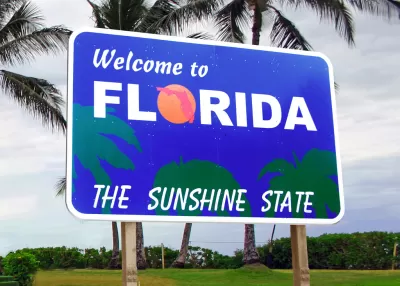For the third consecutive day, COVID-19 cases in the Sunshine State have set records, exceeding 4,000 for the first time. PolicyLab in Philadelphia now predicts Florida will be the epicenter of the pandemic in the U.S. by mid-July.

"After days of rising positive coronavirus case numbers, new studies now predict Florida could be the new epicenter for the pandemic," reported Angelina Salcedo on Friday (June 19) for WTSP, a CBS-affiliated television station serving Tampa.
Rising by the thousands, the state of Florida is quickly turning into one of the nation's coronavirus hot spots. Epidemiologists say it won't stop there.
"Between six to 18 thousand new cases a day can be expected for Florida by the second week of July. That's a tremendous increase [from] what we have now," Dr. Jay Wolfson with University of South Florida (USF) Public Health said.
On Saturday, WTSP posted that the Florida Department of Health "reported a total of 4,049 new confirmed COVID-19 cases in the state. It is now the largest single-day spike in positive case reports since tracking began." [See graph on upper-right of Florida's COVID-19 Data and Surveillance Dashboard.]
Before the new numbers were reported, Friday's report saw the largest single-day spike of COVID-19 cases with 3,822. Before that, new cases saw the biggest jump on Thursday with a reported number of 3,207.
Additionally, the state is now reporting a positivity rate of over 12-percent in the state. Over the last two weeks, the percentage has fluctuated between 3-percent and 12-percent.
According to the Whitehouse and CDC Guidelines for Opening Up America Again (posted here), before proceeding to a phased comeback, states should show a "downward trajectory of documented cases within a 14-day period or a downward trajectory of positive tests as a percent of total tests within a 14-day period."
The World Health Organization advised governments on May 14 that before reopening, "rates of positivity in testing (i.e, out of all tests conducted, how many came back positive for COVID-19) of should remain at 5% or lower for at least 14 days," notes the John Hopkins University Coronavirus Resource Center testing hub.
PolicyLab model
"New models from health experts at Children's Hospital of Philadelphia's PolicyLab predict Florida could be the next epicenter for the COVID-19 pandemic," reported Chelsea Tatham for WTSP on Thursday.
In a blog post on Wednesday, the authors state Florida "has all the makings of the next large epicenter...the risk there is the worst it has ever been in our projections."
State leaders, including Gov. Ron DeSantis, continue to cite increased testing as the reason behind the jumps in new cases. However, some experts, including Dr. Marissa Levine with USF Public Health, say increased testing and the state's percent positive rate aren't necessarily the best indicators for how well the state is responding to the virus. [See related WTSP article: Epidemiologist says data can be misleading and coronavirus is spreading in Florida].
However, the newscast accompanying Saturday's article indicates that testing has not increased, unlike the positivity rate. DeSantis points to increased positive cases among two groups: migrant farmworkers and millennials, reflected in increases in the 25-34 age group.
Reopening timeline
"Florida's second phase of reopening began on June 5, when places like movie theaters, bowling alleys and bars were allowed to reopen with capacity and social distancing restrictions," adds Tatham. "Gyms are also able to operate at full capacity with restrictions."
The state began the first phase of reopening on May 4, which allowed restaurants, retail stores, museums, libraries and gyms to open with restrictions.
World Health Organization warning
The world has entered a "new and dangerous phase” of the coronavirus pandemic, said WHO Director-General Dr. Tedros Adhanom Ghebreyesus at a press conference on Friday, reported
More widespread testing is no doubt playing some role in the increase in the number of known cases. But growing hospitalizations and rising rates of positive tests compared with total tests in many of those states make clear that the virus is raging uncontrolled across much of the Sun Belt.
NPR reported that the pandemic "reached a new one-day high Thursday with 150,000 new confirmed cases, according to the World Health Organization...with almost half being reported in the Americas."
Related in Planetizen:
-
[Oregon and Utah Press Pause on Reopening] June 15, 20205
-
Second Wave or Second Peak? [PolicyLab model], May 27, 2020
-
President Trump's Plan to Reopen the Economy Rests with States, April 20, 2020

Maui's Vacation Rental Debate Turns Ugly
Verbal attacks, misinformation campaigns and fistfights plague a high-stakes debate to convert thousands of vacation rentals into long-term housing.

Planetizen Federal Action Tracker
A weekly monitor of how Trump’s orders and actions are impacting planners and planning in America.

In Urban Planning, AI Prompting Could be the New Design Thinking
Creativity has long been key to great urban design. What if we see AI as our new creative partner?

King County Supportive Housing Program Offers Hope for Unhoused Residents
The county is taking a ‘Housing First’ approach that prioritizes getting people into housing, then offering wraparound supportive services.

Researchers Use AI to Get Clearer Picture of US Housing
Analysts are using artificial intelligence to supercharge their research by allowing them to comb through data faster. Though these AI tools can be error prone, they save time and housing researchers are optimistic about the future.

Making Shared Micromobility More Inclusive
Cities and shared mobility system operators can do more to include people with disabilities in planning and operations, per a new report.
Urban Design for Planners 1: Software Tools
This six-course series explores essential urban design concepts using open source software and equips planners with the tools they need to participate fully in the urban design process.
Planning for Universal Design
Learn the tools for implementing Universal Design in planning regulations.
planning NEXT
Appalachian Highlands Housing Partners
Mpact (founded as Rail~Volution)
City of Camden Redevelopment Agency
City of Astoria
City of Portland
City of Laramie





























